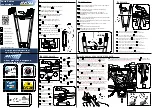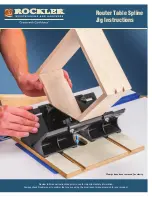
www.portevelo-mottez.com
www.bicyclerack-mottez.com
Porte 3 vélos
sur attelage
FR
- notice d'utilisation
EN
- fitting instructions
DE
- bedienungsanleitung
ES
- instrucciones de uso
IT
- istruzioni per l'uso
NL
- gebruiksaanwijzing
PR
- instruções de operação
1.
POSITIONNEMENT DU PORTE VELO.
CONA009P3NM 16327
FR
- En position ouvert, poser le porte vélo sur la
boule, en butée sur les vis A .
EN
- In the open position, fit the cycle carrier on
the towball, butting up against screws A .
DE
- Den Fahrradträger in Stellung „offen“ auf die
Kupplungskugel setzen mit Anschlag an den
Schrauben A .
ES
- En posición "abierto", poner el porta-
bicicletas sobre la bola, hasta el tope, en el
tornillo A .
IT
- In posizione “aperta”, mettere il portabici
sulla testina, ad incastro con la vite A .
NL
- De fietsdrager in ‘open’ positie op de kogel
plaatsen, in de aanslag op de schroeven A .
PT
-
Em posição "aberto",colocar o porta-
bicicletas sobre o elo, em batente sobre os
parafusos A .
A
2.
SERRAGE.
FR
- Poussez fortement la poignée vers le bas pour un serrage optimum.
Un effort de 60 kg doit être appliqué.
EN
- Push the handle down firmly, to achieve the best tightening.
A force of 60 kg must be applied.
DE
- Den Griff kräftig nach unten drücken, um eine optimale
Klemmverbindung zu erreichen. Es muss ein Anpressdruck von 60 kg
aufgewandt werden.
ES
- Empujar con fuerza la empuñadura hacia abajo para un ajuste óptimo.
Se debe aplicar una fuerza de 60 kg.
IT
- Spingere con forza la maniglia verso il basso per un serraggio ottimale.
Applicare una forza di Kg. 60.
NL
- Het handvat krachtig naar beneden duwen voor een optimale
bevestiging.
Er moet een kracht van 60 kg aangebracht worden.
PT
- Puxar fortemente a pega para baixo para um aperto ideal.
Deve ser aplicado um esforço de 60 kg.
60 kg
FR
- Mettre le cadenas E afin de
sécuriser votre produit.
EN
- Lock your carrier with the
padlock E .
DE
- Vorhängeschloss E zur
Sicherung gegen Diebstahl
anbringen.
ES
- Poner el candado E para
asegurar el producto.
IT
- Applicare il lucchetto E per
proteggere il mezzo.
NL
- Slot E plaatsen om uw
product vast te maken.
PT
- Colocar o cadeado E para
colocar o produto em segurança.
E
4.
VERROUILLAGE.
FR
- Insérer la vis C puis serrer la
molette D .
EN
- Insert screw C and then
tighten wing nut D .
DE
- Die Schraube C einführen,
anschließend die Spannvorrichtung
D anziehen.
ES
- Introducir el tornillo C , y
apretar la ruedecilla D .
IT
- Inserire la vite C e stringere la
manopola D .
NL
- Schroef C plaatsen en dan
wieltje D vastdraaien.
PT
- Inserir os parafusos C e
apertar a moleta D .
C
D
All our products are designed &
manufactured in France.
"S" MINI
=
55 kg
=
B
FR
- Si nécessaire, permuter la position de l'axe B (de 1 à 4),
en position ouvert, pour régler le serrage. La position 1 est la plus robuste.
EN
- If necessary, change the position of pin B (between 1 and 4),
while in the open position, to adjust the tightening. Position 1 is the tightest.
DE
- Falls nötig, die Position des Stiftes B (von 1 bis 4) in Stellung „offen“ ändern,
um die Befestigung einzustellen. Position 1 ist die belastbarste.
ES
- En caso necesario, cambiar la posición del eje B (de 1 a 4),
en posición "abierto", para regular el ajuste. La posición 1 es la más fuerte.
IT
- Se necessario, scambiare la posizione dell’asse B (da 1 a 4)
in posizione “aperta”, per regolare la tenuta. La posizione 1 è la più robusta.
NL
- Indien nodig de positie van as B wijzigen (van 1 tot 4),
in ‘open’ positie om de bevestiging af te stellen. Positie 1 is de krachtigste.
PT
- Se necessário, permutar a posição do eixo B (de 1 a 4),
em posição "aberto", para ajustar o aperto. A posição 1 é a mais robusta.
3.
REGLAGE.
1
2
3
4
5.
MISE EN PLACE DES VELOS ET SERRAGE.
FR
- Disposer le vélo le plus lourd en premier, le côté pédalier en appui sur
le bras (vue 1 ) Serrer les cadres avec les sangles en caoutchouc, puis
solidariser le tout à l'aide de la
sangle de serrage totale
F en passant
dans les roues :
Cette sangle garanti le maintien des vélos.
DE
-
Das schwerste Rad zuerst positionieren, die flache Seite des Pedals
liegt an der Stange an (Bild 1 ). Die Rahmen mit den Gummigurten
festzurren, dann alles mit dem Gurt für die
Komplettverspannung
F , der
durch die Räder geführt wird, zusammenhalten:
Dieser Gurt garantiert den
festen Halt der Räder.
ES
- Colocar en primer lugar la bicicleta más pesada, con el lado de los
pedales apoyado en el brazo (vista 1 ). Apretar los cuadros con las
correas de goma, a continuación unirlo todo con la
correa de ajuste
completo
F , pasándola por todas la ruedas:
Esta correa garantiza la
sujeción de las bicicletas.
IT
-
Posizionare la bicicletta più pesante per prima, il lato pedale
appoggiato sul braccio (figura 1 ). Stringere il telaio con le cinghie di
gomma e fissare il tutto con la
cinghia di serraggio totale
F passando
nelle ruote:
questa cinghia assicura il fissaggio perfetto delle biciclette.
NL
- De zwaarste fiets eerst plaatsen, de trapas tegen de arm laten steunen
(foto 1 ). De frames met de rubberen riemen vastmaken, daarna alles
vastzetten door
bevestigingsriem
F door de wielen te steken.
Deze riem
zorgt dat de fietsen blijven vastzitten.
PT
- Dispor primeiro a bicicleta mais pesada, o lado do pedal em apoio
sobre o braço (vista 1 ) Apertar os quadros com os tensores em borracha,
solidarizar tudo com a ajuda do
tensor de aperto total
F passando nas
rodas:
Este tensor garante a segurança das bicicletas.
F
EN
- Position the heaviest cycle first, the pedal side resting against the arms (inset 1 ). Secure the frames
with the rubber straps, then pull everything together with
general tightening strap
F , passing it through the
wheels:
This strap ensures that the cycles are held firmly.
1



















